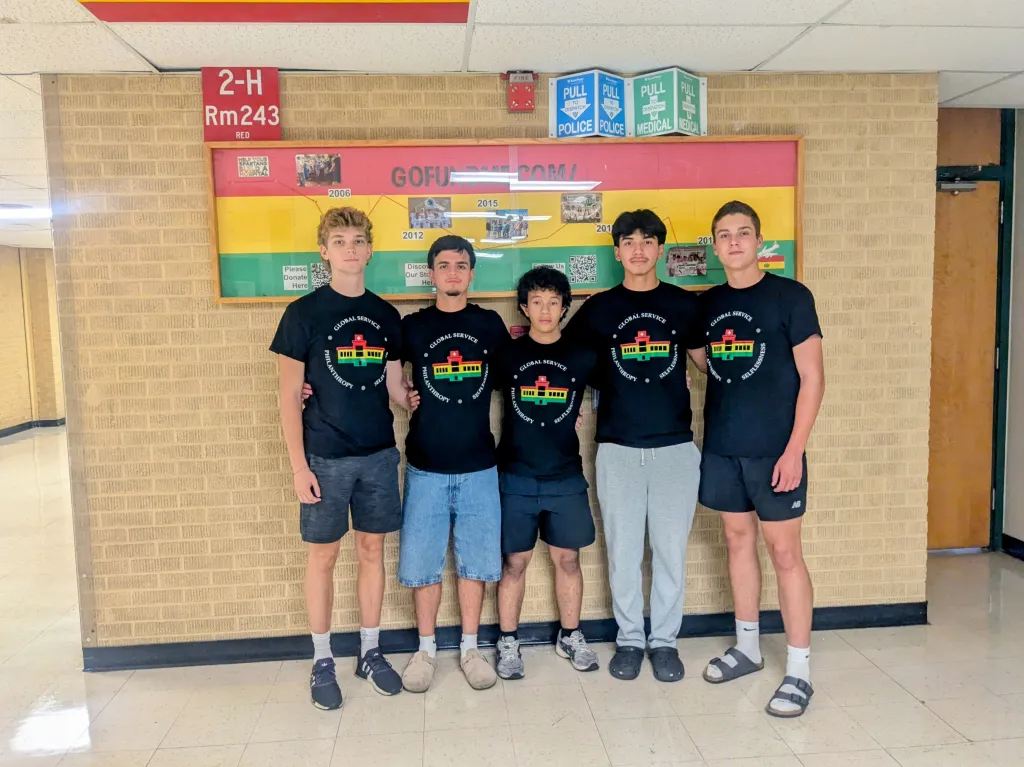
There are students at Oak Lawn Community High School who have experienced poverty overseas, and those who have heard about it from their immigrant parents. And a handful of OLCHS students plan to get a firsthand look as well as the chance to help do something about it.
At the end of the school year, five seniors plan to travel to Bolivia to help build Bethel Hospital in Amachuma, the only Level 1 trauma center in the country’s rural highlands. They’re doing it as part of the school’s Spartans Without Borders club, with the help of physics teacher Chris Repa, the club’s sponsor.
“My passion for this trip is deeply rooted in my childhood,” said student Isaac Bayas, whose dad is from Ecuador and mom from Mexico. “Every time I am put in an environment of indigenous communities and a completely different lifestyle … it makes me very grateful for what I have.”
Bayas’s mother is a nurse practitioner who has taught him the importance of good health care.
“She’s inspired me a lot to be kind and welcoming,” Bayas said. “As someone who has the resources, I can make an impact on someone’s life and continue to spread the kindness she taught me.”
To help enable the trip, the five seniors are organizing “Bowling for Bolivia,” a candlelight bowl from 8 to 11 p.m. Oct. 24 at Suburbanite Bowl of Westmont, 201 W. Ogden Avenue. Tickets are $70 and the event includes dinner, a short program, bowling and raffles.
They’re hoping to raise $20,000 from this event and are also fundraising through a GoFundMe campaign, t-shirt sales, and possibly another major event in the spring for additional funds.
Even the fundraising has been a learning experience.
“I feel like you can gain some very important life skills,” said student Belal Moutaouakkil, whose parents are from Morocco. “We had to look up and read about bowling alleys within a 25-mile radius to find a suitable host for the event. … We need to have sponsors, handle ticket sales.”
They’re also learning about the destination.
“Mr. Repa explained the terrain to us and as the date gets closer, we’re going to familiarize ourselves with the language and people,” he said. “I’m a person who likes to help and the hospital we’re going to build is the only trauma center within hundreds of miles,” said Belal. “We feel obligated to help – there are so many people without proper medical care.”
The students plan to be there for 17 days, participating in manual labor during mornings and in the evening going with local residents to play soccer. Toward the end of the trip they plan a group excursion.
Student Eli Kulpinski said he was interested in a new experience, in addition to helping people in need.
“I think this is good for me to go out there to see it instead of just talking about … the poverty, lack of medical supplies,” Kulpinski said, adding he’s learned that the hospital project has been in the works for about 10 years. “It’s been a long process.”
Emiliano Lopez, whose parents are Mexican immigrants, joined the Spartans Without Borders club last spring.
“It really stands out from other clubs,” he said. “It will give us the chance to help people out internationally. I just really feel for these people.”
That empathy is partially a result of trips he’s taken with his parents to under-resourced areas of Mexico.
“It makes me grateful for how I live,” Lopez said. “I could only imagine how much worse it is in Bolivia, it’s one of the poorest countries in South America.”
Fellow club member Marco Budzak, whose parents are from Slovakia, said he’d like to pursue a medical career, which has furthered his desire to help.
“To see other people and how they live and need help will be a very eye-opening experience,” Budzak said.
Repa, the teacher who started the club in 2004 as Cross Countries, said the rural hospital will work in concert with an urban counterpart, staffing a few full time doctors and dentists while others travel to the area a few days a week to assist with the patient load.
“The native people are scared to go to the capital (for medical care) and it’s too expensive to get there.”
Before his teaching career, Repa did plenty of domestic and international service work, including travel with a doctor in the South American country.
“The worst day in America is still better than the best day in Bolivia,” he said.
Repa said he was proud of his students because even just planning the fundraiser was a feat.
“They’re on a mission that’s not going to get much buy-in because we’re servicing a foreign country that people don’t have a connection to,” said Repa. “They are extremely hard workers with the odds stacked against them.
“We want to inspire people to pay it forward.”
He said the students had spent the summer coming to school to meet with him as the club restarted after a hiatus of several years following the pandemic, and now they’re brainstorming several times a week and texting regularly. They’re learning event planning, raising awareness and fundraising, he explained.
“This is an entirely student-led group,” he said. “I’m extremely proud of these young men.”
Janice Neumann is a freelance reporter for the Daily Southtown.